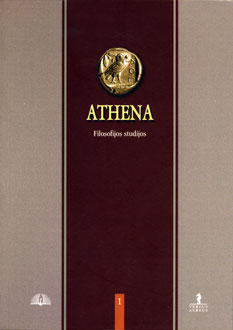Suvaržančios ir išlaisvinančios ribos: ribos ir beribiškumas senovės graikų ir šiuolaikininėje filosofijoje
Limits That Confine and Limits that Liberate: Limits and Limitlessness in Ancient Greek and Contemporary Philosophy
Author(s): Naglis KardelisSubject(s): Philosophy
Published by: Lietuvos kultūros tyrimų
Keywords: limits; limitlessness; boundaries; ancient Greek philosophy; contemporary continental philosophy; freedom; transgression; chaos; monotony; form; apeiron; globalization; unification; variety; multiplicity; measure; finiteness; infinity.
Summary/Abstract: The article investigates the relation of limits and limitlessness to freedom and human creative potential in the context of ancient Greek and contemporary philosophy. It is shown that limits and limitlessness are understood very differently in these philosophical traditions. Contemporary continental (especially French) philosophy tends to understand freedom as potentially limitless: such freedom is thought of as having an absolute and ultimate value, not as a means to improve human condition, to achieve something other than freedom or to cultivate virtue. Sometimes this limitless freedom is conceived in a purely negative way, that is, as such a form of freedom which is exercised in an infinite series of transgressive acts. The ancient Greek philosophy also values freedom but understands it differently: limitless freedom, in the opinion of Greek philosophers, would coincide either with the slavery of formless chaos or with the slavery of formless monotony. In the age of globalization and rampant unification which tends to engulf all spheres of human life, the latter kind of slavery is especially worthy of attention. Having these two perspectives – that of the ancient Greek philosophy and that of contemporary continental philosophy – in mind, it is worthwhile to examine how human creativity is related to the problem of limits, especially the self-imposed limits to one’s freedom. The Greek understanding of freedom gives us an insight into the conditions of human creative potential: in order to free oneself from the slavery of monotony, one needs to create in one’s life a variety of some kind, and the variety of any kind is unthinkable without various and different forms; the forms, in their own right, cannot exist without the boundaries that delineate the contours of forms, and these boundaries are nothing else than the limits imposed on the limitless and formless apeiron. It is argued that limitless freedom and the monotony of existence that plagues modern (or, rather, postmodern) humankind go hand in hand. Therefore it is evident that if we are to escape this monotony, we should understand human freedom as did the ancient Greek philosophers, i.e., not as an end in itself, but as a condition of creatively rich and full-blooded life. Consequently, we should teach ourselves how to fill our existence with a multiplicity of beautiful forms, and we should understand that this multiplicity cannot be achieved without knowing and appreciating the value of limits in the overall contemporary environment of limitlessness and limitless freedom.
Journal: Athena: filosofijos studijos
- Issue Year: 2006
- Issue No: 1
- Page Range: 12-27
- Page Count: 21
- Language: Lithuanian

